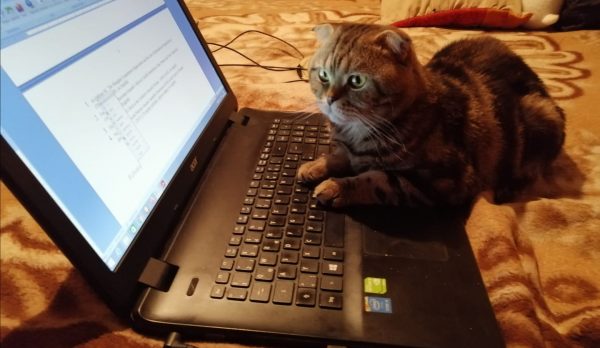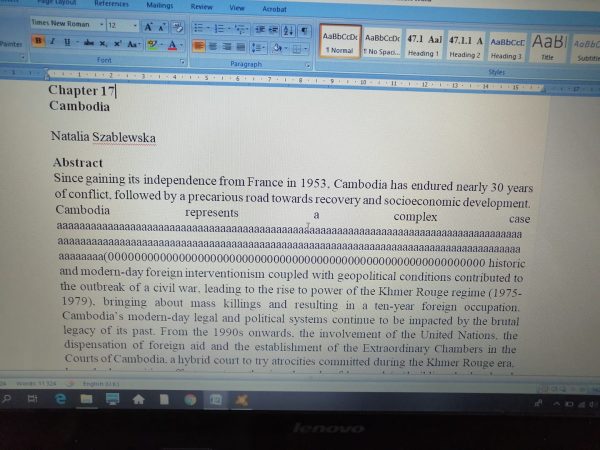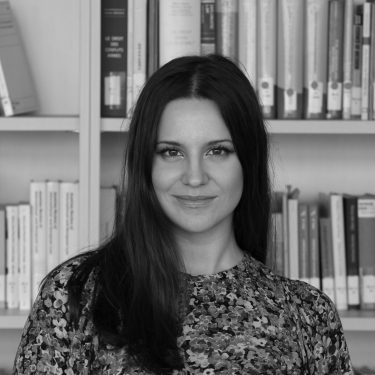Welcome to the latest interview of the Völkerrechtsblog’s symposium ‘The Person behind the Academic’! With us we have Prof. Sergey Sayapin, and through the following questions, we will try to get a glimpse of his interests, sources of inspiration and habits.
Welcome Prof. Sayapin and thank you very much for participating in our symposium!
Thank you so much for having me!
May I first ask what it was that brought you to academia and what made you stay?
I think I wanted to become an academic since I was a student. However, I also wanted to acquire some solid professional experience. Therefore, after I completed an LLM in International Human Rights Law at the University of Essex in 2000, I got a job at the International Committee of the Red Cross (ICRC) in Central Asia where I stayed for fourteen years. During my time there, I worked in almost all ICRC communication programmes, including law, education (for schools and higher education institutions), and public relations. In 2008, I started a part-time doctorate at the Humboldt University of Berlin, under Professor Gerhard Werle´s supervision. My Dr. iur. thesis was on the crime of aggression in international criminal law. Soon after I defended the thesis in December 2013, KIMEP University in Almaty announced an academic vacancy in law – et voilà, I have been living and working here since August 2014.
Now I think that my career path was just about right. When you teach law, you must very well know the technical side of what you teach in order to be credible. Students often ask questions which go beyond theories and textbooks. My experience of negotiating, drafting implementing legislation and official correspondence, lecturing, and organising numerous events for academics and professionals, which I acquired at the ICRC, is very useful. The ICRC also helped me build a network of academic contacts throughout Central Asia and the post-Soviet space. Since 2014, I have been working on establishing academic contacts with colleagues throughout the world to learn from them, and to make Central Asian perspectives on international law better known and understood abroad.
If you were not an academic, what would you be?
If I had not become a lawyer, I might have become an actor, singer, or musician. I started playing the piano when I was about eight and am very fond of music. I like many genres, but musicals are definitely my favourite one. During my LLM year at the University of Essex, I played the part of Peter in Jesus Christ Superstar at the Lakeside Theatre there. Notre Dame de Paris was a source of my inspiration when I started learning French 23 years ago. I often ask my students to watch the musical Les Misérables when I teach criminology. And I like telling my students that lawyers should consciously cultivate their sense of beauty – through music, literature, paintings, theatre, cinema – because law is about justice, and justice is about beauty.
Could you share with us three authors or books that have had a major impact on your perception of justice?
There are many such books, and, probably surprisingly, most of them are not law monographs. There is a reason for this. I am confident that the privilege of thinking about justice should not be reserved to lawyers. Justice should be owned by the entire human family – and therefore, all people should learn about justice from non-professional books they like. Again, Les Misérables by Victor Hugo is full of food for thought about justice. The Name of the Rose by Umberto Eco is another such book. Any major epos is full of ethical dilemmas about justice – take the example of Manas, Mahabharata, The Iliad, or any other one. You can learn about justice from novels about Robinson Crusoe or the Treasure Island. Importantly, anyone can learn about justice and related concepts – such as crime, punishment, forgiveness, mercy – from their national literature, which makes these ideas even closer and dearer to one´s heart. And law books should just build some professional constructs on the general foundation of humanities.
Which are three texts that you would wish all academics working on international law would read?
Again, I can think of more than three texts but if I must choose, my choice will be as follows. Is International Law International? by Anthea Roberts tells an important truth behind international law, which especially international lawyers themselves should be aware of: there is arguably no single international law but rather many somewhat different perceptions of it. If we accept this, and learn from each other, we will probably be able to improve the quality of communication between international lawyers and policy-makers representing different regions. Next, Realizing Utopia edited by Antonio Cassese is a great work about the future(s) of international law. And last but not least, Judge Christopher Weeramantry´s Islamic Jurisprudence: An International Perspective is an excellent perspective on Islamic law – including Islamic international law – written by a non-Muslim author. To me, this is a prime example of respect for another legal culture, and my own interest for Islamic international law was, to a significant extent, inspired by this book.
What is your greatest disappointment with international law? And in which way(s), do you think that international law is wrongly criticized?
Actually, international law as such has not disappointed me so far. I think it is one of the best inventions of the human mind. I like calling international law “The Great Invisible”, since it does work “invisibly” most of the time, and we might not even notice its role in improving the quality of our lives and well-being, while things are in order. We start talking about international law when it is grossly violated – for example, when a State attacks another State, or when a gross violation of human rights happens somewhere. In such situations, we might even hear that international law “does not work”, or that “the time of international law has come to an end”. Well, I think that the rumours of the “death” of international law are grossly exaggerated. What is true is that States, international institutions and other actors should learn being more resolute in invoking responsibility under international law. Take the example of Russia´s aggression against Ukraine. It has been ongoing since February 2014 – however, comprehensive sanctions were introduced against Russia only in 2022, after the full-scale invasion of Ukraine. If the world had introduced stronger sanctions soon after February 2014, the full-scale invasion might not have happened at all. Or else, if the world had responded after Russia´s use of force against Georgia in August 2008, Russia probably would not have used force against Ukraine in 2014. The law of international responsibility should be applied more consistently and resolutely, so that potential wrongdoers would know the price of their wrongful acts in advance.
What is your favourite place to read and write? What is always near you when you read and write?
I like writing at home, sitting on a sofa. To focus, I need space and tranquility, which one does not easily find at the office. I do not usually do research on the days I teach at the university – I use those days to communicate with colleagues and students, and to test some of my ideas in my dialogue with them. When I write, I like having my cat next to me 🙂 When I sometimes leave my computer unattended, he likes reading my work – and even corrects it 🙂


[Pictures taken by Sergey Sayapin and sent to us with regard to this question.]
Have you ever drawn influence from any form of art in your work? Is there anything artistic about writing academic texts on international law?
Sure, both in my teaching and research. For example, in 2019, I introduced a new course, Law and the Arts, intended for freshmen. The course is interdisciplinary, and introduces the first-year students, through well-known examples from books, theatre, cinema, paintings, songs and other pieces of art, to fundamental legal ideas such as justice, rules, responsibility, crime, punishment, forgiveness, etc. I believe courses like this are crucial, for they show that law concerns everyone, and not only lawyers, and cultivate the sense of justice among young people.
Academic writing is always about art, to various extents. It is always about persuading your reader, and hence about mastering the art of rhetoric. It is about writing clearly and correctly, and hence about style and grammar. Since the word count of an academic article, book chapter, or a book is limited, writing is about composition – that is, limiting your text to exactly what is needed, and leaving out what is unnecessary. Just like a painting must contain all indispensable details, and not contain secondary ones, because they would distract one´s attention from the main message. Editing a book is like conducting an orchestra: just like a piece of music is beautiful if its length is about right, all instruments are in order, and all musicians are there and play in tune, the book will be good if its structure is comprehensive, all topics are covered, and all authors are all experts in their fields. One can take one´s work to the level of art if one intends it to be like that, and invests enough work and inspiration.
Which of your publications is your favourite one? And which of them is your least favourite?
I like all of them. I think all of them had to be written, because each of them sought to respond to a question at a time when a substantive response was needed, from my perspective. But we need to distinguish between substance and form. Certainly, not all my publications are equally good in formal terms. I would like to think that I am a better writer now than I was twenty years ago – and it is right so, since we are all learning. My first academic articles consisted of just a few pages. The most recent book, of which I am the lead co-editor, consists of two volumes and about 1500 pages written by 64 authors. I am incredibly proud of the book, and of the work we have accomplished together. This is the most important academic project I have coordinated so far. But hopefully, there will be more. And they will be my new favourites.
What are you working on currently? What may we anticipate in the near future?
In addition to a few articles and book chapters I am contributing to books edited by colleagues, I am working on two book projects, and contemplating others. Later this year, I should finish a book on Central Asian perspectives on international law, to be published by Hart. Hopefully, the book will usefully contribute to the growing body of scholarship on comparative international law. I am also updating my book on the crime of aggression, to take account of important developments since 2014. After that, I am planning to write a book on the implementation of international criminal law in the post-Soviet space. And right now, I am putting together a team to work on an edited book on the post-Soviet public law – including developments in constitutional and administrative law, criminal law and procedure, and public international law. Ad maiora!
Thank you very much Prof. Sayapin for participating in our symposium and for having taken the time to respond to our questions!

Sergey Sayapin LLB, LLM, Dr. iur., PhD is an Associate Professor at KIMEP University´s School of Law (Almaty, Kazakhstan). His current research focuses on Central Asian and post-Soviet approaches to international law, international law and security as well as law and society, technology, and economics.

Spyridoula Katsoni is Research Associate and PhD Candidate at Ruhr University Bochum’s Institute for International Law of Peace and Armed Conflict (IFHV).
